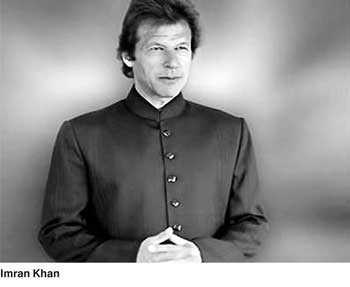Sunday Feb 22, 2026
Sunday Feb 22, 2026
Saturday, 22 September 2018 00:00 - - {{hitsCtrl.values.hits}}

There are clear signs that Pakistan’s freshly minted Prime Minister, Imran Khan, will make a sincere effort to reduce corruption and maladministration in the domestic sphere. In foreign affairs he is likely to make a brave attempt to mend fences with arch rival India and put ties with the US on a realistic footing.
But there are also unmistakable signs that Imran will go soft on Islamist radicals; turn a blind eye to their depredations; and what is worse, do their bidding without a whimper putting aside his personal liberal preferences only to remain in power.
“Tolerance” of religious and sectarian “intolerance” has become a basic requirement for capturing and retaining power in Pakistan thanks to the Islamisation of the country in the 1980s by the military dictator Gen. Zia-ul-Haq.
In other words, Prime Minister Imran Khan is likely to ignore or brush under the carpet, acts of discrimination, persecution and violence perpetrated against the “Ahmadiyyas”, who are considered “heretic” by the majority Sunni Muslims. The Ahmadiyyas do not subscribe to the belief that Prophet Mohammad is the last prophet or the last direct messenger of God. The Ahmadiyyas consider their late 19th Century founder-leader, Mirza Ghulam Ahmad, a “subordinate prophet” or a Mahdi, a concept which mainstream Muslims consider totally un-Islamic.
Case of Dr. Atif Mian
The case of the appointment and the subsequent rejection of Dr. Atif Mian is illustrative. The 43 year old Princeton economist, considered as being among the top 25 young economists in the world, was appointed member of the Prime Minister’s Economic Advisory Council (EAC). But when Sunni Muslim clerics used the social media to stir up opposition to Dr. Mian because he is an Ahmadiyya who had also propagated the faith, Imran got him to quit.
Two other EAC members, Dr. Asim Ijaz Khwaja from the Harvard Kennedy School and Dr. Imran Rasul, a Professor of Economics at University College, London, quit in solidarity with Dr. Mian.
But this was of no avail because the opponents of Dr. Mian were enormously strong. The Tehreek-e-Labbaik, a new right wing outfit, had threatened a public protest. A petition was filed in the Islamabad High Court challenging his appointment. Call attention notices were submitted both in the National Assembly and the Senate against Atif Mian’s nomination. The call attention notice in the National Assembly was submitted by Maulana Asadur Rehman, son of Jamiat Ulema-i-Islam-F (JUI-F) chief Maulana Fazlur Rehman and, in the Senate, it was moved by Maulana Ataur Rehman, the brother of the JUI-F chief.
MPs belonging to the Muttahida Majlis-i-Amal and even liberals and secular nationalists, put their signatures on the notice in the Senate. The Pakistan Peoples’ Party (PPP), however, did not support the move. Nawaz Sharif’s Pakistan Muslim League (N) also said it did not support the notice though some of its MPs had signed the motion.
Imran told a TV channel that he was not aware of Dr. Mian’s opposition to the belief that Mohammad was the final prophet and that he went only by the fact that he was in the top 25 economists in the world.
With Imran washing his hands off the appointment of Dr. Mian, Information Minister Fawad Chaudhry’s earlier claim that “Pakistan belongs as much to minorities as it does to the majority,” sounded hollow.
Blasphemy law
During the election campaign, Imran had obliquely and cautiously spoken against the draconian Blasphemy law, which could attract a death sentence. According to the Lahore-based Centre for Social Justice, 1,472 people were charged under the blasphemy law between 1987 and 2016. As per available records, 730 of these were Muslims, 501 were Ahmadiyyas, 205 were Christians and 26 were Hindus. Offenses under Blasphemy law, as applicable to the Ahmadiyyas, include wearing an Islamic slogan on a shirt; planning to build an Ahmadiyya mosque in Lahore; and distributing Ahmadiyya literature in a public place. Under Pakistani law, Ahmadiyyas are forbidden from calling themselves “Muslims” or using Islamic symbols in their religious practices. It is said that to get a Pakistani passport, an Ahmadiyya has to declare that he is not a Muslim and that the founder-leader of his sect was an imposter.
History of persecution
The Ahmadiyas have been persecuted since the sect was founded in 1889, but persecution was sporadic till about 1973. Pakistan’s first Foreign Minister and one of the top leaders of the movement to establish the Islamic state of Pakistan, was an Ahmadiyya, Sir Mohammad Zafarullah Khan (1893-1985). He held high posts in the country’s judiciary and brought laurels for Pakistan in the UN and as the President of the International Court of Justice. Dr. Abdus Salam (1926-1996), the lone Pakistani winner of the Nobel Prize in Physics, was an Ahmadiyya.
 During the movement to establish Pakistan, nobody in the Muslim League objected to the support given by non-Muslims like Justice Alvin Robert Cornelius, a Catholic Anglo-Indian judge from Allahabad in India, and an Ahmadiyya like Sir Zafarullah Khan. But things changed in the 1970s, perhaps due to Islamisation riding on the back of Arab petro dollars.
During the movement to establish Pakistan, nobody in the Muslim League objected to the support given by non-Muslims like Justice Alvin Robert Cornelius, a Catholic Anglo-Indian judge from Allahabad in India, and an Ahmadiyya like Sir Zafarullah Khan. But things changed in the 1970s, perhaps due to Islamisation riding on the back of Arab petro dollars.
As a result of the increasing acceptance of extremist ideas, Dr. Abdus Salam did not get his due in Pakistan till 2016, when Prime Minister Nawaz Sharif named a Mathematics Institute after him. Justice Cornelius, who drafted the Pakistan Resolution of 1940, was disillusioned with Pakistan eventually.
In 1974, a wave of anti-Ahmadiyya disturbances spread across Pakistan, forcing parliament to amend the constitution to define the term “Muslim”. The amendment listed groups that were deemed to be “non-Muslim”. The Ahmadiyyas were classified as “non-Muslims”.
10 years later, in 1984, five ordinances which targeted religious minorities were promulgated. These were: a law against blasphemy; a law punishing the defilement of the Quran; and a law to prohibit insults to the wives, family, or companions of the Prophet of Islam. Two laws specifically curbed the activities of the Ahmadiyas.
In 26 April 1984, military dictator Gen. Muhammad Zia-ul-Haq’s Ordinance XX struck a big blow at the Ahmadiyyas by prohibiting them from “indirectly or directly posing as Muslims.” Thus, the Ahmadiyyas could no longer profess their faith, either orally or in writing.
The police destroyed Ahmadiyyas’ translations of, and commentaries on, the Quran, and banned their publications. The Ahmadiyyas were barred from using Islamic terminology on their wedding invitations. Ahmadiyya funeral prayers were banned. The display of the Kalima (“there is no god but Allah, Mohammed is Allah’s prophet”), the principal creed of Muslims, on Ahmadiyya gravestones was prohibited.
In addition, Ordinance XX prohibited Ahmadiyyas from propagating their faith, building mosques, or making the call for prayer. “In short, virtually any public act of worship or devotion by an Ahmadiya could be treated as a criminal offense,” the Human Rights Watch (HRW) said.
On 28 May 2010, extremist Islamist militants attacked two Ahmadiyya mosques in Lahore with guns, grenades, and suicide bombs, killing 94 people and injuring well over a hundred. Twenty-seven people were killed at the Baitul Nur Mosque in Model Town, Lahore. 67 were killed at the Darul Zikr mosque in the suburb of Garhi Shahu. The Punjabi Taliban, an affiliate of the Pakistani Taliban, called the Tehrik-e-Taliban Pakistan (TTP), claimed responsibility for the attacks.
The police routinely ignore banners seeking “death to the Qadiayanis” (as Ahmadmiyas are popularly known). “The government’s failure to address religious persecution by Islamist groups effectively enables such atrocities,” commented Ali Dayan Hasan, Senior South Asia Researcher at HRW.
Extremist Islamic organisations like Sunni Tehrik, Tehrik-e-Tahafaz-e-Naomoos-e-Risalat, Khatm-e-Nabuwat and other groups, acting under the Taliban’s umbrella, have a free run of Pakistan. No wonder Dr. Atif Mian’s economic expertise, sorely needed to end Pakistan’s balance of payments crisis, has been sacrificed at the altar of religious extremism.